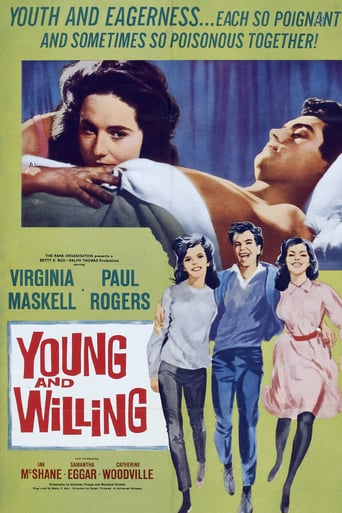JohnHowardReid
This movie's entertainment assets can be summarized on one hand: Attractive location photography, mostly on the campus of London University (Ernest Steward); the climbing the tower sequence, which is put across with a fair degree of excitement (despite the fact that the whole thing is utterly incredible -- many viewers will notice that there is a flagpole on the tower to which the flag could easily have been hoisted); the presence of the lovely Denise Coffey in the cast (unfortunately she has only one tiny scene plus a couple of all-too-brief glimpses of her ride in the Rag procession); and finally, Catherine Woodville who, wouldn't you just know it, has by far the smallest role of the three female principals.Now for the bad news: The script is a compendium of all-too-familiar university clichés. None of the characters ever get down to any serious study. If there were any brilliant ideas in Harry's essay, the audience was kept in the dark. In fact, the characters seem to spent all their time drinking, playing, horsing around and talking, talking, talking! Just about every character in the film is a self-centered, one dimensional introvert, focusing exclusively on his or her own petty, trivial "problems". The central character, as interpreted by Ian McShane, is, as he himself admits, a total bore -- yet the scriptwriters and director focus on him relentlessly (not that the other characters are much more interesting). By cutting only half of McShane's scenes, the film could easily come down to 73 minutes. Then by taking the scissors to Virginia Maskell and Samantha Eggar, plus the simple expedient of deleting all the unconvincingly hearty opening scenes, the film could easily level just 63 minutes. At that length it would make a just passable support. In other words, a good movie to come late for! On the other hand, 114 minutes of this rubbish? Someone has got to be kidding!
writers_reign
For some reason this Room At The Top clone has eluded me up to now, not that I missed much. The parallels are striking; 'working class' lad slightly out of his element when thrown into contact with a class above his own, involved with two women, one 'nice' girl his own age and one older married woman. For Joe Lampton read Harry Brown (Ian McShane) and for local government read local university. There's even a nod to Joe Lampton marrying upwards via Harry's schoolfriend, also on campus who has snared Jeremy Brett's scion of a sweet tycoon. In referential terms Harry Brown is like a prototype of Jimmy Porter albeit some six years after Look Back In Anger, and even more bizarrely he comes off as a somewhat neutered Porter lacking the vitriolic pen of John Osborne to round him off. The cast is interesting to say the least, Paul Rogers unusually wooden, Johnny Briggs sporting a Welsh accent that fits where it touches, a barely recognizable John Hurt with the timbre already there but little hint of the fine actor he would become but all of these are dwarfed by the finest acting of all by the tragic Virginia Maskell. A curio at best.
morrowmmm
I saw some of this film being shot around Lincoln Cathedral, an area not condusive to great film making. The film is important because of the debut of three future stars. Firstly the brigadier's daughter Samantha Eggar (older half sister of the also beautiful Toni) who went onto fame in The Collector and, for U.S. audiences, Dr Dolittle. Faded from view pretty quickly. Secondly Ian McShane who has had a long career, more in the U.K., but has been in some U.S blockbuster miniseries. He is also known to A&E audiences for his portrayal of a lovable, rascally antique dealer in the hilarious "LoveJoy'series. Last but certainly the best known is John Hurt who has proven himself in the International cinema as a highly respected actor and star. Don't watch the film watch the people.
Marco Trevisiol
This film is well worth a look despite it having some weaknesses that stop it from truly being a memorable film. Strangely, the greatest weakness this film has is its central plotline, that being the affair with Harry Brown and the professor's wife. This comes across as melodramatic and somewhat forced while the rest of the film is realistic and absorbing.


